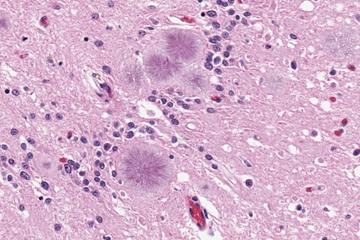A Newly Discovered Prion Causes Muscular System Atrophy

Alpha-synuclein, the only prion discovered in 50 years, might be the cause of a deadly brain disorder called muscular system atrophy (MSA). The finding by UCSF researchers, published in the journal PNAS, could help diagnose the progressive disorder and find a treatment.
Prions are proteins with alternative conformations, from which at least one can be transmitted to other prion proteins. The infectious agent propagates in an exponential form with a fatal outcome. The misfolded conformation promotes the formation of toxic aggregates that end up causing microscopic holes in the tissue and eventually a sponge-like structure. Prions are responsible for the Creutzfeld-Jacob disease and the bovine spongiform encephalopathy, among others. All prion diseases are located in the brain.
MSA causes malfunction of the autonomic nervous system and is similar to parkinsonism. At a molecular level, filaments of alpha-synuclein are found forming cytoplasmic inclusions in the glial cells, responsible for neuronal homeostasis. The researchers decided to test whether alpha-synuclein could cause prion formation. They inserted a mutated copy of the alpha-synuclein gene in a human cell line and in mice, and transfected them with brain homogenates from MSA patients. The mice developed MSA and the cultured cells presented alpha-synuclein deposits, traceable by the yellow fluorescent protein fused to the former. The scientists concluded that MSA is caused by a newly discovered strain of alpha-synuclein prion.
Unclear definition of what constitutes a prion
Some scientists have challenged the study conclusions. Dr. Valerie Sim from the University of Alberta argued that prions cause disease in healthy tissues, whereas MSA-affected homogenates were harmful only in the presence of a mutated version of alpha-synuclein. She welcomed the results and possible treatments that could be developed, but dismissed warnings of human to human transmission.
Source: livescience

